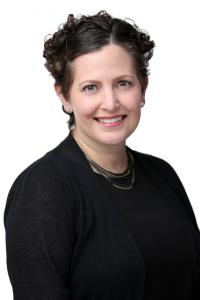Ob/Gyn Dispatches During COVID-19: Beth Rackow, MD
Each day during the COVID-19 crisis, we'll share an update from a member of our team in the Department of Obstetrics and Gynecology at Columbia University Irving Medical Center. Today's note is from Beth Rackow, MD, Associate Professor of Obstetrics and Gynecology at NYP/CUIMC.
Loss is a prevalent sentiment these days. Loss of the normal pattern of daily life, loss of community, loss of face-to-face engagement with others, loss of time spent in fresh air without a mask. And sadly, loss of family members, friends and colleagues, and loss of employment.
As a woman living with a rare cancer for the past four years, I understand the concept of loss far too well. The loss of control over one’s body is a constant reminder that cancer can be irrational, and the path to beating it doesn’t always have a straightforward roadmap, especially when the disease is so rare. I’ve been on and off experimental drugs, had two surgeries, and was in the midst of a rough regimen of chemotherapy until COVID-19 hit New York City.
Being immunocompromised from chemotherapy is just too risky when living in the COVID-19 epicenter. So my cancer treatment that seemed to be helping came to an abrupt halt. Thanks to the coronavirus, I don’t know what comes next.
This unprecedented time brings with it a cruel and profound loss that I had not anticipated. As an immunocompromised physician during this once-in-a-lifetime (hopefully!) COVID-19 pandemic, I’ve been sidelined in a way that I never would have imagined. I never thought I would be so far from the front line. I went to medical school and have worked hard for years for the privilege to take great care of patients. And this is the first time that I cannot engage in a face-to-face, or mask-to-mask, way. I feel cheated out of this experience.
There is an empty space inside me that I just can’t fill. No matter how many patients I continue to help, it’s not the same. No matter how many virtual meetings I attend, I can’t be fully engaged. I know that if I get infected by the coronavirus, my risk of serious illness is much greater because I’m immunocompromised. But my heart still prefers hands-on doctoring to this extreme form of social distancing.
I spend my days in my makeshift home office, being as fully present as possible. I see my patients on my phone screen as we navigate this new experience known as “telehealth,” doctoring without being in the same room or putting hands on a person. This too is a loss – the patient-provider interaction just isn’t the same – but someday soon, we hope to return to a semblance of normal.
I am so proud of my colleagues in the Department of Obstetrics & Gynecology at New York Presbyterian/Columbia University Irving Medical Center who have been at the epicenter of this pandemic for the past six weeks. Your tenacity, bravery, resourcefulness, and dedication to the patients is commendable, and I am so fortunate to be a small part of this big team. And I am thankful for all you have done to protect me, your immunocompromised colleague, from exposure to coronavirus.
Every night at 7 p.m., my husband, my 15-month old son, and I open our windows and along with thousands of our neighbors, cheer for the essential healthcare workers. I cheer for all those who are doing what I can’t do right now. As my son grows up, I will tell him about what it was like to live through this pandemic, and how he learned to clap by participating in the nightly 7 p.m. cheer.
Although I’m an immunocompromised physician, sidelined for now, this will not be my permanent state. I refuse to be defined by this horrible disease. I can’t wait to get back in the game, and stand shoulder-to-shoulder (and 6 feet apart) from my colleagues. In this time of great challenge and loss, we will come out of this pandemic better and stronger and more connected and more driven than ever.
Beth Rackow, MD

